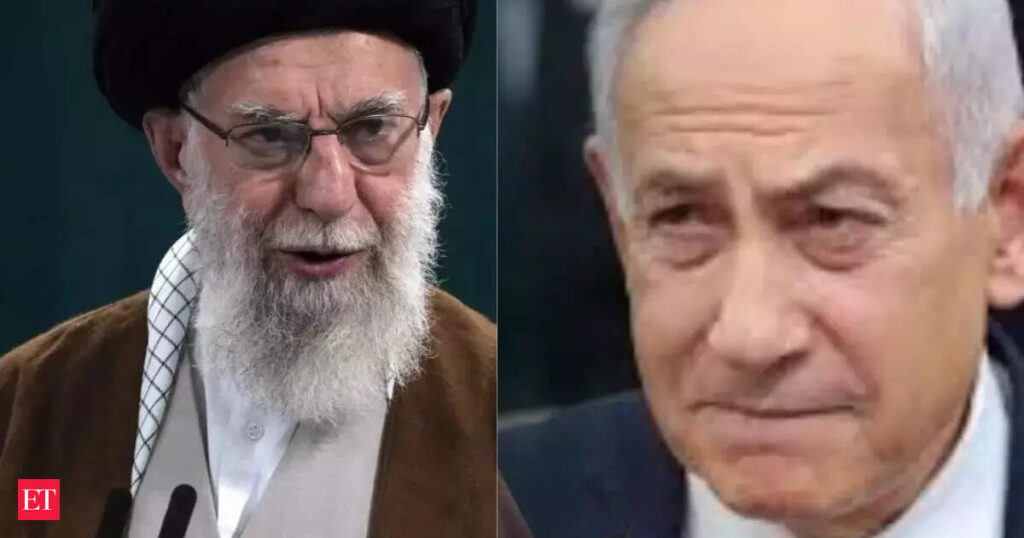What triggered the Israeli strikes?
According to Israeli officials, the decision to launch Operation Rising Lion was based on growing concerns that Iran was close to developing a nuclear weapon. Israeli Prime Minister Benjamin Netanyahu said the strike was a “targeted military operation to roll back the Iranian threat to Israel’s very survival.”
“This operation will continue for as many days as it takes to remove this threat,” Netanyahu said.
An Israeli military official described the assault as a “preemptive, precise, combined offensive,” targeting Iran’s nuclear programme and long-range missile capabilities.
Iran-Israel War: What’s next, what it means for the world and trade?
Israel says the operation could continue for several days. The situation remains tense and unpredictable. The coming days will determine whether the conflict widens or whether diplomatic channels intervene to prevent further escalation.
The Israeli strike on Iran’s nuclear facilities could reshape several layers of international relations and global trade. In the short term, it increases the risk of a broader military conflict in West Asia. If Iran retaliates directly or through its allied groups in Lebanon, Syria, Iraq, or Yemen, the region could spiral into prolonged violence.
Israel-Iran Conflict’s impact on Trade
For global trade, the immediate concern is the Strait of Hormuz, a critical shipping lane through which nearly a fifth of the world’s oil passes. Any Iranian attempt to disrupt this route—something Tehran has previously threatened—could trigger a sharp rise in global oil prices, disrupt energy supply chains, and affect economies already under inflationary pressure.
Diplomatic Realignments
Countries that have maintained strategic neutrality between Israel and Iran—like India, China, and Gulf nations—may now face diplomatic challenges. They will be under pressure to either condemn or support the action, which could alter trade and defence ties in the region.
On the military front, this strike could encourage a shift in alliances. Arab states that have normalised relations with Israel under the Abraham Accords might quietly support the move, seeing Iran as a shared threat. Meanwhile, Iran may turn more aggressively toward China and Russia for diplomatic and military backing.
The situation also places the United States in a tight spot. While Washington was reportedly informed in advance, it has publicly distanced itself from the strikes. However, any escalation that affects US troops in the region could force American involvement, intentionally or otherwise.
In the longer term, this strike may trigger a new phase in the nuclear arms race in West Asia. Iran might accelerate its weapons development in response, prompting neighbouring states like Saudi Arabia to pursue similar capabilities.
What targets did Israel hit?
Israel confirmed that dozens of fighter jets carried out coordinated attacks on nuclear and military sites across Iran. The IDF said, “Dozens of IAF jets completed the first stage that included strikes on dozens of military targets, including nuclear targets in different areas of Iran.”
Netanyahu elaborated on the targets:
“We struck at the head of Iran’s nuclear weaponistion program. We targeted Iran’s main enrichment facility in Natanz. We targeted Iran’s nuclear scientists working on the Iranian bomb. We also struck at the heart of Iran’s ballistic missiles program.”
Explosions were reported northeast of Tehran and near the Natanz nuclear site. Witnesses confirmed that multiple blasts were heard close to a uranium enrichment facility.
Who were killed in the attack?
Iranian state media reported casualties, including key figures linked to Iran’s nuclear programme. Hossein Salami, commander-in-chief of the Revolutionary Guards, is believed to be among the dead. Fereydoon Abbasi, former chief of the Atomic Energy Organisation of Iran, was also reported killed.
Why Israel hit Iran now?
Tensions between Israel and Iran have been high for years, but the Israeli leadership says the nuclear threat has reached a critical point. A statement from the Israeli military said, “Today, Iran is closer than ever to obtaining a nuclear weapon. Weapons of mass destruction in the hands of the Iranian regime are an existential threat to the State of Israel and to the wider world.”
The timing may also be connected to recent intelligence reports, growing regional instability, and fears that Iran could activate proxy forces against Israel.
How has Israel justified the attack?
Netanyahu framed the strike as an act of national security and regional defence.
“This is a clear and present danger to Israel’s very survival,” he said. “In defending ourselves, we also defend others. We defend our Arab neighbours. They, too, have suffered from Iran’s campaign of chaos and carnage.”
How has Iran responded so far?
As of now, Iran has not officially confirmed the full extent of the damage but has acknowledged attacks near key facilities. Flights have been suspended at Tehran’s international airport, and explosions were reported in several areas.
Iran has not publicly announced retaliation yet, but Israel has declared a state of emergency and is preparing for potential counterattacks. Air raid sirens were heard in Jerusalem, and civilian air traffic to Tel Aviv has been redirected.
Where does the US stand?
The US was informed in advance of Israel’s intentions, according to a CBS report. The Biden administration had advised some Americans to leave the region.
However, Washington has distanced itself from the attack. US Secretary of State Marco Rubio said, “Israel advised the US it attacked Iran for self-defence.” He added, “The US was not involved in the Israeli strikes on Iran.”
Former US President Donald Trump also weighed in before the attack, saying, “I don’t want them going in because, I mean, that would blow it.”
Source:https://economictimes.indiatimes.com/news/new-updates/iran-israel-war-why-israel-bombed-irans-nuclear-sites-and-what-it-means-for-global-security-oil-and-trade/articleshow/121817049.cms


